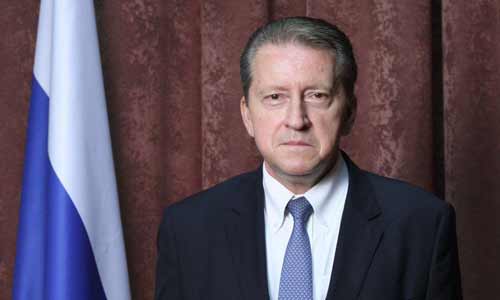New Delhi [India]: The Russian ambassador to India Nikolay Kudashev on Monday batted for an open dialogue between India and Pakistan, adding that Moscow was ready to play the role of a mediator if New Delhi and Islamabad required Moscow’s role in ironing out bitter political differences.
At an event marking 70 years of establishment of diplomatic ties between New Delhi and Moscow at Ananta Aspen Centre in the national capital, the Russian envoy said, “We are open for contacts with every country, especially if it would help to ensure the regional stability, which, on the other hand, also remains largely dependent on constructive relationship between New Delhi and Islamabad.
“No doubt, that existing disagreements between India and Pakistan should be resolved politically and diplomatically, according to the provisions of the 1972 Shimla Agreement and the 1999 Lahore Declaration. We believe in dialogue, and stand ready to support it, if requested by both sides,” the envoy said.
Kudashev reiterated Russia and India as global partners on the need to prioritise implementation of the UN-based mechanisms and decisions to fight international terrorism, to establish rule-based responsible behaviour in the information security domain, to prevent arms race in outer space, to support the international trading system and prevent protectionism practices, to shape just and equal global financial architecture, to strengthen climate change regime under the Paris Agreement and to avoid politicization of regional crises and human rights issues.
The Russian envoy underscored that both countries wished to see a stable and peaceful Afghanistan.
“In principle, Russia and India share similar views of what country we want Afghanistan to be: stable, independent, peaceful, democratic, prosperous, friendly to all neighbours, sovereign and well connected to the regional economic network,” he said.
Kudashev reiterated the strong bilateral relations between India and Russia, saying that the two countries proudly boast of durable and multipronged ties.
Stressing the importance of enhancing bilateral trade, he said, “The year 2017 showed an inspiring trend with 21.5 percent increase in the turnover, making the final figure close to USD 10 billion. This year also started with positive tendency. Together we strive to achieve USD 30 billion in trade and USD 15 billion in investments by 2025,” he said.
The Russian envoy said that the construction of nuclear power plants in India is an established area of cooperation, which underlined mutual trust and friendship between the two countries.
Speaking on the status of Kudankulam plant in Tamil Nadu, Kudashev added, “It is noteworthy that while first four units of Kudankulam nuclear plant, with two already operational and two more under construction, are subject to 20 percent localisation. The next two units, 5 and 6, will source up to 50 percent of locally manufactured parts and equipment. It is an excellent example of how Russian economic interests concur with the Indian domestic agenda and its requirements.”
Delving into other projects, the Russian ambassador further said, “The Russian Sibur company together with Reliance Industries are constructing a butyl rubber plant in Gujarat, which is to become operational in 2019. The Russian Railways are involved in the study of the Nagpur-Secunderabad high-speed train project with further plans to participate in its execution.”
He also outlined the potential in future activities of the Russian Export Centre, a government institution aimed at facilitating Russian small and medium exporters with financial and non-financial support. It has received the permission to open its branch in Mumbai with a separate office in New Delhi.
Kudashev said that about 60 to 70 percent of military equipment, armaments and ammunition in India are of the Russian origin, which he cited as another solid indication of the high level of mutual trust between New Delhi and Moscow.
Lauding the Centre’s Make in India flagship initiative and conducting regular joint military exercises, the Russian envoy added, “In this respect, the ambitious “Make in India” initiative offers unlimited opportunities, with engagement of Indian private defence manufactures being another new feature. We are also very proud to conduct regular large-scale military exercises. Our recent achievement in this regard – combined three forces drills in 2017. Again, it is something, which India also doesn’t have with any other country.” (ANI)

